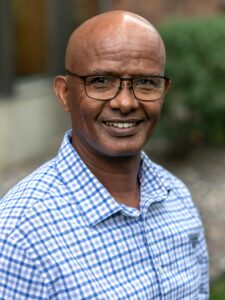 By Pastor Wondimu Sonessa
By Pastor Wondimu Sonessa
Long before the spreading of formal education, the priests of the Ethiopian Orthodox Church were teaching how to read and write. I remember some students joining our second-grade class because the government declared that such instruction was illegal and all children must join government schools.
About the same time, I found a piece of paper these students dropped on our classroom floor and read a story about Jesus’ incarnation, crucifixion, and resurrection for the first time. For some reason, I didn’t throw it away. I took it home after school and read it to my uncle and asked him who Jesus is and how a man can live again after death. He told me that it is not for us ordinary people to talk about and understand this story. He stated that the Orthodox priests only can speak about Jesus.
I was not still baptized because my parents were adherents of Islam though my grandfather and all my dad’s siblings went to the Orthodox church occasionally. But four years later, at the age of 12, I received the Holy Baptism with my mom and my younger siblings, on the day of Ethiopian Epiphany at the Orthodox church.
“Jesus came to our village through local farmers preaching the gospel, healing the sick, setting people free from evil spirits, and giving peace and hope to the poor and the marginalized in society.”
Although it was beyond my little brain to comprehend what it means to be baptized in the name of the Holy Trinity, I remember the feeling of excitement and joy that being called a Christian created in my heart. Here started the companionship of the Holy Spirit that carried me through until Jesus himself, whose story I read from that piece of paper, came and found me when I was 17.
FOR ME, THAT WAS a time of transition as it is the case with every Ethiopian teenager. The country was in a traumatizing war between the military regime and the then-freedom fighters. For the adherents of Protestant Christianity, it was a time of severe persecution. Inviting someone to believe in Jesus was deemed a crime by the law of the country. Missionaries from America and Europe were not allowed to stay in the country because they were considered a threat for the regime’s socialist (and atheist) ideology.
“Although it was beyond my little brain to comprehend what it means to be baptized in the name of the Holy Trinity, I remember the feeling of excitement and joy that being called a Christian created in my heart.”
Amid this, the gospel they preached has already started to bear fruit. The Evangelical churches were in a spiritual warfare against the oppressive, unclean, and killer spirit ingrained in individual life, religious practices, and societal systems. They were committed to spreading the message of peace, hope, and love through telling the story of Jesus beyond boundaries.
Consequently, Jesus came to our village through local farmers preaching the gospel, healing the sick, setting people free from evil spirits, and giving peace and hope to the poor and the marginalized in society. The sermons that changed my life were preached by these lay preachers whose education doesn’t exceed elementary school.
VERY RECENTLY, I STARTED to wrestle with the question of whether I found Jesus’ name on the piece of paper or Jesus himself found an eight-year-old me on the second-grade floor. This brings to my mind the question Nathanael asked Jesus, saying, “Where did you get to know me?” Jesus answered, “I saw you under the fig tree before Philip called you” (John 1:48).
“The sermons that changed my life were preached by these lay preachers whose education doesn’t exceed elementary school.”
Jesus came to the earth to find the lost and the less religious “ordinary people.” He confirms this when he asserts, “I was sent only to the lost sheep of the house of Israel” (Matthew 15:24). It is true that God knows us even before we were born. But the question that matters to believers in Jesus Christ is beyond chronological order of our encounter with the divine reality. We all need to wrestle daily with the question of whether we are leading a life worthy of the calling to which we have been called (Eph 4:1).
We are called to share God’s love with God’s world. This requires hearing, understanding, and telling the story of Jesus’ incarnation, crucifixion, and resurrection.
